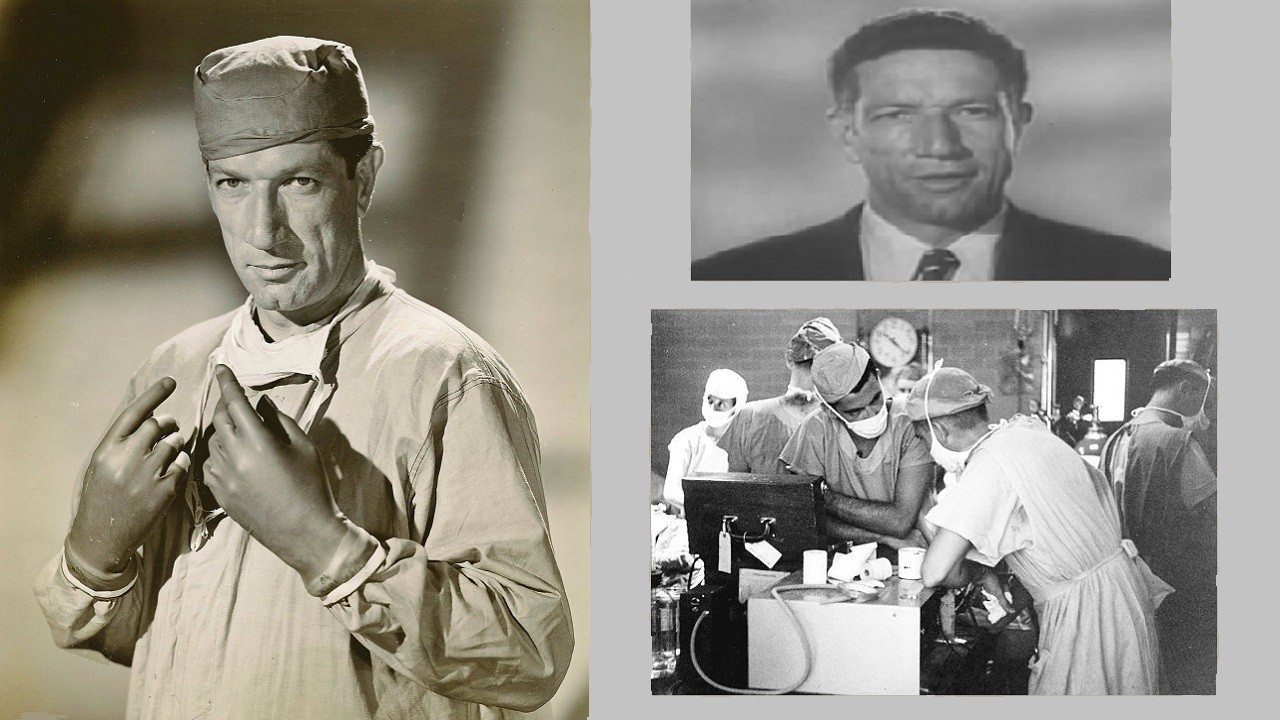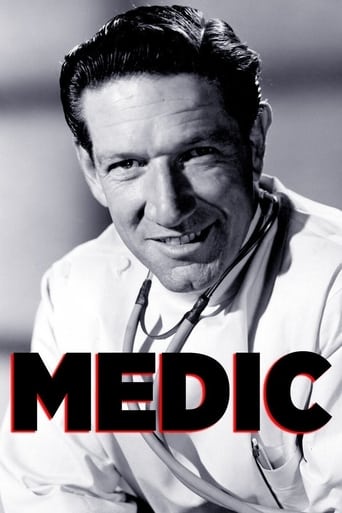

Sadly Over-hyped
... View MoreLack of good storyline.
... View MoreAfter playing with our expectations, this turns out to be a very different sort of film.
... View MoreClose shines in drama with strong language, adult themes.
... View More"Medic" is a top-drawer medical drama that ran from 1954 to 1956. The series took the same anthology approach that was later adopted by "Twilight Zone" and other shows: each episode had established and up-and-coming actors in a different medical drama each week. The steady Richard Boone starred as Dr. Konrad Styner, who narrated each show and acted in several. The show was well-directed, compact, and compelling.Lots of past and future stars appeared, including Claude Akins, Beverly Garland, Hugh Beaumont, Charles Bronson, Lee Marvin, and many others. The show was remarkably frank for its period and portrayed medicine in a no-nonsense fashion. The series may appear rather technically crude now, but it's a lot better than most shows today, which include inane and suggestive dialogue, swooshing sound effects, screaming laugh tracks and really childish stories. I highly recommend considering the DVD set for an excellent mid-1950s TV experience.P.S. You sure can tell this was made in the 1950s. After a particularly tricky delivery of a newborn, Dr. Styner and another doctor start smoking cigarettes outside the delivery room!
... View More"Medic" is one of the finest shows ever produced for television. The grandfather of 'modern' medical shows, in many ways it is styled as a documentary; each segment deals with a specific medical issue and all bets seemed to be off - breast cancer, epilepsy, diabetes mental illness, tuberculosis, muscular dystrophy, leprosy, poor parenting, and hearing loss were all covered and more. During a time when one couldn't use the word pregnant on television, the series presented the story of a woman who dies while giving birth, and the birth is shown. It is often graphic and surprisingly candid, many times quite serious. Voice-over narration gives many facts and explanations about diagnoses and procedures.This series is a time capsule of where medicine was in 1954-6, which makes it invaluable as a teaching tool for those studying medicine, especially since each episode is packed with information about the illness being dealt with (imagine seeing what a polio sufferer went through). This series was overseen by doctors, and many appear in the series.The producer was Worthington Miner, who was responsible for Studio One, one of the greatest live dramatic anthology series in the history of television. The 'host' of the series is Richard Boone, an exceptional actor, director and teacher. He appears in every episode, but only acts in a few of them (one of them is one of the best in the series, about a possible atomic bomb attack). He is so convincing as a doctor that many viewers did not think he was an actor, and when it came time for him to audition for "Have Gun, Will Travel," the producers were initially not sure that he would be convincing. Overall, the acting is exceptional, with such actors as a very young Dennis Hopper, Vera Miles, Bobby Driscoll, Beverly Garland, Lee Marvin, Warren Stevens and more.Music was written by Victor Young, and orchestrated by Sidney Fine. This is one of the last projects composed by Young (he died in 1956) and it beautifully supports the action. Many of the scores are just plain gorgeous, and it's a pity that Young did not record an album of some the themes he wrote for the series (thankfully, many of the scores he wrote exist, donated to UCLA).Such a series was doomed from the start due to its subject matter and its seriousness; this would be a hard series to watch as a marathon. Immediately branded 'controversial,' it was scheduled at the same time as "I Love Lucy" and was frequently preempted for other programming. It managed to hang on for two years and 59 episodes, of which Timeless Media has made 44 available (reportedly, acceptable prints of the missing 15 could not be located).Still not well known, Medic deserves to be celebrated as the important series it is. If you collect classic early television, the Timeless set is a must-buy.
... View MoreJames Moser was one of the outstanding writing talents in Television history. Sadly, he is almost forgotten and is, probably, quite unknown. He graduated from a Catholic college in California, then booked ship as a sailor on a tramp steamer headed to Australia. After working a variety of jobs in Australia, including journalism, he returned to the states and started writing for Radio. Jack Webb noticed his talent and hired him to be head writer on Dragnet. Moser wrote a wide range of teleplays in the fifties, including a dramatization of the life of Charles Proteus Steinmitz. Moser came up for the idea of an intelligent, realistic medical drama, that would star Richard Boone as Dr. Conrad Styner. To make sure the show was authentic, Moser worked as an orderly in a Los Angeles hospital for nearly two years. Medic, while critically acclaimed, lagged in the ratings, and was canceled after several years. Moser later came up with an idea for an even better, equally hard-hitting medical show, Ben Casey. Later Moser created another superb show that flopped in the ratings, Slattery's People. In 1965, he was the first person to receive The Gabriel Award from The Catholic Academy of Broadcast Professionalws for creating "shows that uplifted the human spirit." Of Course, NONE of them can be found on DVD.
... View MoreMedic had the bad fortune to be scheduled opposite I Love Lucy. Richard Boone, in the character of Dr. Konrad Styner, introduced the stories about doctors' experiences and acted in at least one episode, Flash of Darkness. Had anybody seen it, that episode would have been discussed in every news magazine and on every talk show. In it, Dr. Styner was at his office when he received a call that an atomic bomb had been dropped over the nearby city. He and his staff rushed to an improvised medical center and treated the injured while not knowing if their own families had survived. In 1954, the possibility of an atomic bomb attack by the Soviets was considered very real, and school children practiced marching calmly to the basement (three minute warning) or scrambling under the desk (no warning). Yet, I am not aware that there was any reaction to this show.In another episode, Never Come Sunday, a couple have an autistic daughter. The medical profession can do nothing for the child's condition and the mother desperately seeks out expensive quacks who hold out the promise of a cure. Unfortunately, this show could run today and be as pertinent as it was a half century ago.In the episode, My Brother Joe, a 10 year old boy succumbs to injuries he sustained from being hit by a drunk driver.The show was not exactly escapist fare. It dealt with real issues not often seen on television, and dealt with them realistically and without sensationalism. No wonder it didn't do well.
... View More